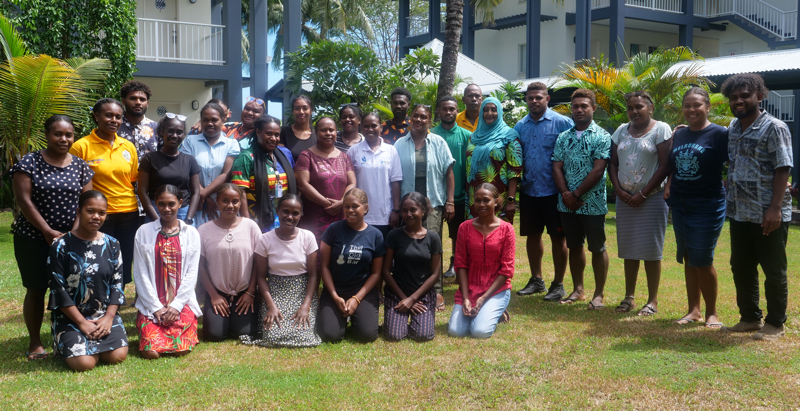THE crucial role played by Human Rights Defenders (HRDs) in democracies and societies was brought to the limelight as HRDs from Solomon Islands, Vanuatu and Fiji gather in Honiara for a workshop to build their knowledge on the legal protection mechanisms available for HRDs and initiate discussions of the development of National Action Plans.
The three-day workshop was held at the Heritage Park Hotel and commenced on Tuesday.
The workshop is aimed at building the knowledge of HRDs from the three nations on local, regional and international legal protection mechanisms for HRDs and to initiate discussions on developing National Action Plans (NAP) for HRD’s protection. It is a buildup on the knowledge from a previous workshop held in Vanuatu in February this year.
In her address at the opening of the workshop, the Office of the United Nations High Commissioner for Human Rights (OHCHR) rep Heike Alefsen shared a quote from the United Nations High Commissioner for Human Rights, Volker Tuerk that, “Human Rights Defenders are visionary agents of change. They see a better future for all of us, and they know how to make that future a reality.”

Ms Alefsen then went to emphasize that everyone has the right and responsibility to defend human rights and this was the simple yet powerful idea behind the United Nations Declaration on Human Rights Defenders adopted by the General Assembly 50 years after that same body adopted the Universal Declaration of Human Rights (UDHR).
“We celebrated the UDHR’s 75th anniversary last year, and while we are pleased that many pledges have been made to live up to the ambition of these Declarations, including by Pacific Island Countries, we must conclude that much remains to be done,” she added.
Ms Alefsen said HRDs must be recognized for the value they bring to democracies and to societies.
She said while some governments may be taking a selective approach to human rights, Pacific HRDs face a multitude of risks from being targeted through online and offline hate speech, constraints on freedom of assembly and difficulty in obtaining legal recognition for their associations, as well as in some cases, arbitrary arrest and detention, harassment, torture and worse.
“Women human rights defenders in the Pacific are often seen as defying social or religious norms and threatening social and customary structures, and sometimes face attacks by both government and non-state actors, both offline and online.
“Women human rights defenders from the Pacific have been demanding tailored support given the specific obstacles and threats they face, such as violence from sorcery related accusations, discriminatory customary laws and policies, restrictive legislation, gender-based violence and sexualized online harassment and bullying,” she added.
Globally, Ms Alefsen said OHCHR has documented at least 34 women HRDs were killed in conflict-affected countries in 2022, but added that this is likely only a fraction of the real number.
She said according to data gathered by OHCHR Global in 2023, 320 HRDs, journalists and trade unionists in 40 countries were killed and many of them while protecting nature and the environment.
“With authoritarianism and repression increasing around the world, and in the context of the record number of more than 60 elections around the world this year, the rights to freedom of expression, to assembly and association, in particular peaceful protest, are also under attack,” she added.
She said HRDs are sometimes attacked or intimated for engaging with the UN on various issues and each year, the UN Secretary-General prepares and presents a report to the Human Rights Council titled “Cooperation with the United Nations, its representatives and mechanisms in the field of human rights.”
Ms Alefsen said these reports provide an update on the trends and subject of intimidation and reprisals for cooperation with the UN from 2015 till 2024 and these reports can be found on the OHCHR website.
The OHCHR rep said very few cases from the Pacific have been reported and hence mentioned in the reports and on that note, she urged the regional workshop participants to use these UN mechanisms and have their say in shaping a shaper world for HRDs.
She said she was pleased to see that this regional workshop will progress the recommendations made in the 2021 OHCHR Report on the situation of human rights defenders, that was made possible with the support of the Swiss Government.
Ms Alefsen thanked the Swiss Embassy in Canberra and especially the Special Envoy for the Pacific for working closely with OHCHR to support HRDs and strengthen the Pacific Human Rights Defenders Network.
“Let’s take action to protect civic space and help us to build a more sustainable and more equal future. I wish you a successful workshop and fruitful deliberations in Solomon Islands for the next 3 days,” she added.
By IAN LADDS OSO
Solomon Star, Honiara









